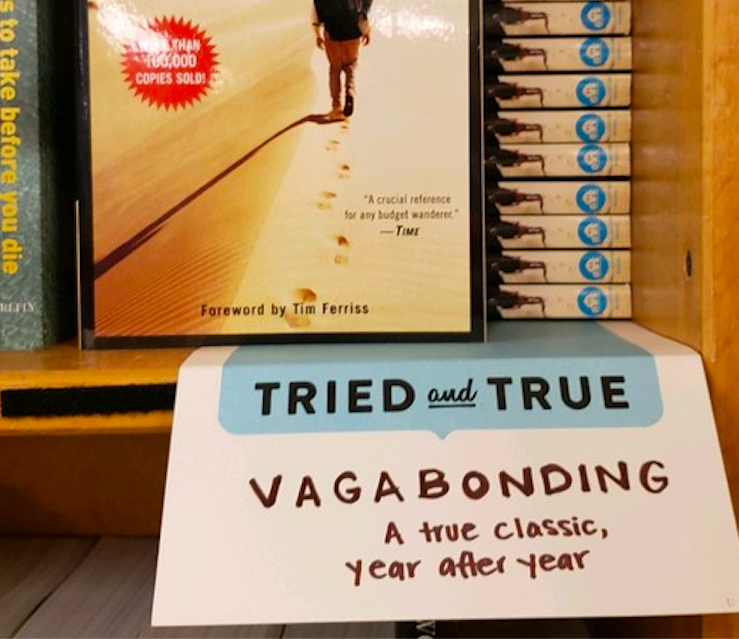Friends and vagabonders,
I’ve been writing these updates for more than two decades now – it’s something I’ve been doing for such a long time that, in the age of continually updated social media, a website Update page feels downright anachronistic. Yet for all the years I’ve written travel-updates from various corners of the world, this is the first time in my lifetime that global pandemic has brought global travel to a halt entirely.
This is something I talked about last month in a Washington Post roundup, alongside such travel personalities as Rick Steves, Pauline Frommer, and Tony Wheeler, about what it is like to be a travel-writer during a time when nobody is traveling. As I say in the article: “The pandemic has reminded me of what a blessing and privilege travel has always been. When I’m able to travel again, I’m sure I will have a sharpened sense of this privilege, and I hope I enjoy the journey even more as a result.”
My biggest travel-disappointment has been the disruption of an early-summer Italy/Switzerland trip I was going to take with my nephew to celebrate his high school graduation. I still hope to take that journey with him at some point in the future, no doubt with a better understanding for how special it is to travel to these distant, beautiful places.
For now, here’s what I’ve been up to in recent months.
Deviate podcast Season Three

Oddly enough, the pandemic atmosphere has created new exposure for my Deviate podcast, since so many people are using podcasts to dream about travel when they can’t literally travel.
The New York Times included Deviate in its “13 Podcasts for Wandering Souls” feature last month. “For most travelers nowadays, home is the only destination,” the article reads. “Yet thanks to some imaginative podcasts, you can still explore the world.” Of Deviate, the article says: “Before there were digital-nomad and vanlife hashtags, people like Rolf Potts, the author of Vagabonding, were traveling the world, rarely staying put for long. Conversations on his podcast include talks with fellow travel writers musing about their craft.”
Deviate has also been recommended as quarantine listening in outlets ranging from my hometown Wichita Eagle, to Hamburg, Germany’s Die Zeit, which recommended Deviate among its “Culture Tips for Quarantine Days” (“Kulturtipps für Quarantäne-Tage”). “Rolf Potts lets his audience know something penetrating in every episode of his podcast,” the article reads.
My podcast, which over the winter had featured topics like dinosaurs, traveling with my parents, work sabbaticals, overcoming Jim Crow, and Super Bowl LIV, shifted to cover COVID-19 related travel concerns, including what it was like to be trapped overseas during the pandemic, what it was like to suffer from the virus, and what it was like to lose family members during the pandemic. I have posted a roundup of my coronavirus episodes online here.
This month I pivoted to Season Three of Deviate, which will continue to look at the fate of travel amid the pandemic, but will also feature episodes on topics like underground travel, freight-train hopping, mortality, The Great Gatsby, and the consolations of philosophy. Please keep an eye out (and be sure to subscribe on your favorite podcasting service)!
Notes from my travels in quarantine

While one year ago I found myself transitioning from a Sumatra/Sri Lanka journey to a Kazakhstan/France sojourn, this year finds me at home on the Kansas prairie. I have been trying to maintain the attitude of travel, even in quarantine (a topic I explored on the Season Three debut episode of my podcast), and often this involves creative initiatives with my parents, who live next door to me.
At times this entails reflecting on our travels together in places like Paris and Prague; at other times it involves events like the Socially Distanced Dinner Party (pictured above) that we threw for my sister Kristin’s family. My parents are at high-risk for COVID-19, so we made distancing precautions an active and celebratory part of the dinner party — which included BYO tables placed along a tape measure, theatric toasts cursing the coronavirus, and a ceremonial tossing of bundt cake from the high-risk table to the lower-risk table.
In general, it feels like the pandemic can be a pretext to get to better know the place where we are right now, even as we dream of other places. More than 20 years ago, when people were still freaking out at the prospect of the “Y2K glitch,” I wrote a short, anti-destination essay for Salon that, weirdly enough, can apply to this time of pandemic. “Information society too often tempts us to idealize the Other,” I wrote, “to know where we want to be instead of knowing where we are. Thus, to realize that Noplace is the only place is a spiritual victory of sorts.”
In general, it feels like this period is a great time to unplug and reset and be less competitive, less worried about trivial things that other people are doing. This is a chance to take an interest in everything and everybody around you right now, and be grateful for what we have.
Journaling as a conversation with oneself

One travel ritual that I’ve been revisiting during this time of pandemic is journaling. For me, this has not just meant writing in my journal daily (to capture my day-to-day experiences and thoughts during this extraordinary moment); it has also meant reading my older journals as a way of staying in dialogue with earlier versions of myself.
When I reread old journals from prior decades, some of the most startling entries are the moments when I reflect on time — reflections that resonate in a whole new way now, with the further passing of time.
For example, here’s an excerpt from June 4th, 1995, recounting a flight to Seattle to visit friends:
“I sat by a couple of funny little Mormon girls, who seemed concerned that I might be shy. They had a lapful of stuffed animals, all of which were named ‘Brownie.’ They kept sticking peanuts up their noses and laughing. They asked me: “How do angels get around?” And: “What does the Heavenly Father look like?” I told them that it doesn’t matter what the Heavenly Father looks like, and they seemed satisfied with the answer.
As we began our descent into Seattle, the man behind me started talking to his grandkids about flying airplanes in WWII, about what the anti-aircraft fire looked like as it floated up to him above Europe. He talked self-consciously, as if he were lying (though he clearly wasn’t). As if he was startled by the irrelevance of a moment that happened so long ago. As if it wasn’t really real any more. As if, strong as memory can be, the present moment is always stronger. As if youth in this present moment, in any present moment, is the only youth there ever is. I wonder what my anti-aircraft fire will be when I’m old. We dream of other places when we’re young, then we get older and dream of other times.”
It occurs to me that those funny little Mormon girls are now in their thirties, that the WWII-vet grandfather is probably no longer with us. I’m still not sure what my anti-aircraft fire might be; I’m guessing it’s a rich collection of small moments, not unlike the one I experienced on that flight to Seattle.
Looking ahead to onward travels

Whenever travel again becomes possible, I think it will, in its own way, become a rich time not just for re-embracing journeys, but for travel-writing itself. One of the great periods in modern travel writing history came between the world wars in the first half of the twentieth century, and was celebrated by the cultural historian Paul Fussell in his classic book Abroad.
Fussell was writing about travel books by people like Graham Greene and Evelyn Waugh and DH Lawrence – and guess what? These writers were traveling in the decade after the Spanish Influenza pandemic killed millions of people worldwide. So, it feels like the coming decade might suffer in terms of industry-slanted travel writing – but hopefully it will thrive when it comes to literary travel writing Ideally from people with all kinds of backgrounds and perspectives, who are willing to be curious and honest and reportorial as they venture out into the world.
Speaking of which, my travel-writer interview series (now in its 20th year) has recently featured insights from Tim Hannigan, Christopher Solomon, Rachel Louise Snyder, Matthew Félix, and Maggie Downs. Meanwhile, my Dispatches department continues to feature mini-essays from places like Sumatra and Sri Lanka.
Here’s hoping I can add more Dispatches soon – even if they simply entail journeys undertaken close to home. Travel safe, everyone, and see you one day back out on the road!





